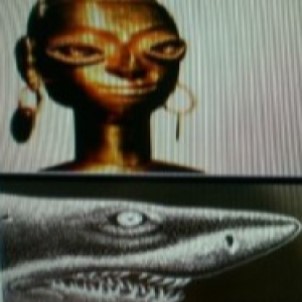
Oriental spices and herbs amazed Europeans in ancient times with their properties. Meat seasoned with pepper was much tastier, while cloves and cinnamon prevented the wine from turning sour and gave it an unusual flavor and aroma. Spices in particular were valued for their magical properties in curing many ailments. They were therefore in great demand.
Constantinople was the only trade route between Asia and Europe. When the Ottomans conquered the city in 1453, they imposed duties on all imported goods. And the price of spices shot through the roof. In Spain, a ten-pound sack of cinnamon could be exchanged for a two-masted schooner. Chinese herbalists and alchemists made magic extracts, ointments, and tinctures from spicy plants and fruits. These potions were used to cure kings and were traded for gold! The monarchs of Europe realized that whoever controlled the spice monopoly would control the world! They organized expeditions to search for these islands, sparing no expense.
In 1492, with money from kings and merchants, the Spanish navigator Christopher Columbus organized an expedition and set off into an unknown ocean. He did not find the desired islands, but he discovered unknown continents! The lands he discovered were full of gold, silver, and precious stones. Exotic animals lived in those lands, and strange fruits grew in the jungles. In the seas and rivers, there were sea cows, giant turtles, and other monsters, and overall this earthly paradise flew flocks of fat ducks and screaming parrots.
The discovery of the navigator became the sensation of the century, and all the monarchs of Europe set their greedy eyes on the overseas lands. But the Vatican Pope gave them to Spain and Portugal, arousing the envy and hatred of all disenfranchised kings. “The sun shines to all alike,” said the King of France, blessing his corsairs to plunder. Spanish conquistadors, French pirates, and adventurers from all the maritime powers of Europe rushed to seize overseas riches. And Spain became embroiled in military conflicts with its neighbors. To fight back, King Philip II (Philip the Prudent) needed a strong army and navy. These could only be built with gold from the new colonies.
It was a year of 1558 when the king Philip II sent orders to his viceroys in the New World to plunder more and immediately send the booty to Madrid. The Spaniards dragged gold from Venezuela and Honduras, and emeralds and diamonds from Colombia. During their raids in the mountain jungles of the Rio Bamba, on the border between Colombia and Ecuador, Francisco Pizarro’s soldiers discovered a cache of gold bars and emeralds. The cache was guarded by seven hundred warriors from the Atahualpa tribe. This tribe worshipped the Yellow Idol, a man-sized statue cast in solid gold. The idol was the religious symbol of the Inca tribe. There was a bloody skirmish between the Indians and the conquistadors…
***
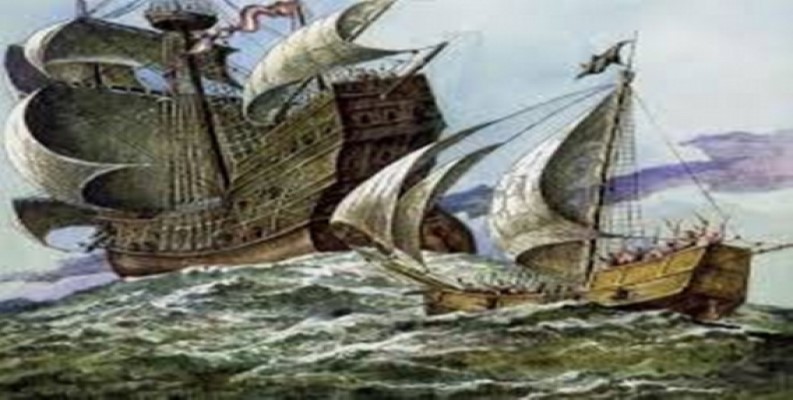
A galleon under the command of Captain Pedro de Arvida, laden with looted treasure, was on its way to Havana when its sailors spotted the pursuit. The ship was heavy, its battered hull shaken by the waves. Sailors worked on pumps pumping out water, but the galleon was losing speed. They were saved by the thick tropical night. But in the fog that enveloped the sea, lurked another danger. Maneuvering near one of the islands, the ship struck a reef. A hole in the bottom left no hope of rescue, and the water flooded the hold.
The captain decided to blow up the galleon to keep the treasure from the pirates. He ordered everyone to take as much gold as they could load into the dinghies. The wicks tied to the powder kegs smoldered, and the boats sailed towards the island, which was visible in the lightning on the night horizon. Minutes seemed an eternity, and then the flames of the explosion broke through the darkness. Smoke from the burning ship spread across the surface of the sea, hiding the fugitives from their pursuers.
There was not enough room for everyone in the dinghies, and many sailors were floating, holding on to ropes, when they were attacked by sharks. The sea became red with blood, and the redder it got, the more satanic the sea jackals became, more and more of them. They were tearing and devouring everyone in the water. The locals gathered on the shore of the island, alarmed by the echoes of the explosion.
When the exhausted fugitives approached the coast, the islanders pulled their boats ashore, fed, and sheltered them. Finding much gold in their boats, the islanders slipped palm berry juice into the unfortunates’ drink. It was an Indian poison, a powerful soporific. Having drugged the survivors, the islanders killed them all. And shared the spoils. Centuries have passed since then.
***
450 YEARS LATER.
Jack and John are good friends, both grew up on the coast and are in love with the ocean. As children, they were seen together everywhere, and when they disappeared on their boyish errands, worried parents would ask neighbors: Have you seen J&J? They nicknamed their sons “J&J”, after the first letter of their names.
As teenagers, John and Jack rode the waves on homemade boards and became keen boaters and night fishermen, venturing out to islands in the ocean. Having developed a passion for scuba diving and spearfishing, they spent every holiday on new adventures.
This time they flew to an island in the waters of Honduras, dreaming of hunting big fish. This was their second flight, the last time John had gotten into trouble by injuring a huge bass. The angry fish dragged him into deep water and he had to drop his rifle to avoid being trapped in the coral caves. Now he was out for revenge.
Their plane hums in the night sky. John is reading ‘The Pirate Treasure of Roatan’, a book he bought at the airport. And Jack is bored by the dark porthole:
“Hollywood fairy tales for teenagers, John? Come on, let’s have a drink,” he jealously interrupts his buddy.
“Oh, it’s very educational. And I could do with a drink though,” John smiles. The stewardess brought them rum.
“So, do me a favor, read something, mate, we’ve got all night,” Jack sips from his glass.
“OK, if that’s what you want,” John laughed, “but I’ll bet you ten to one you won’t be bored.”
“I’ll take that bet,” Jack licked his lips.
“Then listen to this, ” John flips through the pages, “The author of this book is Daryl Friesen, an archaeologist and hunter of sunken treasure. He tells interesting stories about the place we’re flying to now. It turns out that Roatan Island was a favorite place for pirates in colonial times. From there, they raided Spanish settlements in Colombia, Venezuela, and Honduras. On the island, the pirates set up a pirate base called Augusta. There they hid their booty. And century later, after piracy was wiped out, the English visited the island. In 1843, the ruins of the pirate settlement were marked on maps by Royal Navy officer Lieutenant Jeremy Tandyke, and in the twenties of our century archaeologist Mitchell Hughes decided to try his luck and find the gold buried by the pirates.
He wasn’t a fool, this Hughes! He settled on the island and spent seven years there, studying old maps, talking to fishermen, and finally figuring out where Augusta was.
Hughes summoned a mate and his daughter to the island. Using a primitive metal detector, they found and dug up four chests full of gold doubloons. Rumors spread around the island and by the time they reached the local police, the British realized it was time to leave. At night, loading the gold they had found aboard their sailing ship ‘Amigo’, they sailed to British Honduras, now Belize. There they disposed of the schooner, packed the gold in crates, and boarded a steamship to New York.
There, Hughes presented his archaeologist credentials to customs officials and claimed the shipment as archaeological shards. In New York, he found antique dealers and sold the treasure to them for millions of dollars. Then, returned to England, bought a castle, and lived the rest of his life as a rich bum. And what do you think of this story?” John smiled.
Jack took out a tenner and put it in his mate’s pocket.
“And that was when the mystery happened,” John continued, “in addition to the pirate gold, the archaeologist discovered something that interested him as a scientist. Hughes learned from locals that in the waters around the small island of Helena, off the remote cape of Roatan Island, the remains of buildings could be seen on the seabed in calm weather. Hughes went there by boat. Digging in the island’s coastal caves, he found artifacts testifying to a civilization unknown to science, which seems to have existed long before the colossal shaking of the Earth’s crust that submerged much of the land. Hughes found evidence of this catastrophe in the rock paintings of the Inca people, who had lived there for thousands of years. The archaeologist was sure he was on the verge of a major scientific sensation. He believed that the artifacts he had found in the caves and those hidden in the waters of Helena Island were the remains of the legendary Atlantis. But in running away from the island with the gold, Hughes was also running away from science. If he made his discovery public, he would be exposed, prosecuted for the stolen goods, and imprisoned. It was either world fame or money. Fate gave him a chance without a choice…”
“One more thing about mysticism,” John flipped through the pages and found the right one, “This story had been told to the archaeologist by an old fisherman. In the seventeenth century, his ancestors lived on the island of Helena. One day a Spanish galleon ran aground on a reef not far from the island and the locals found a lot of gold in the boats of survivors. But soon a powerful underwater shock caused a huge wave that washed away all the settlements on the island, along with all the inhabitants. Only a few fishermen who were out that day to buy their equipment on Roatan survived. The old Indians said it was the curse of the Yellow Idol, whose golden statue the Spaniards had stolen from the Incas…”
“Than, other adventurers came to Roatan after Hughes,” John flipped through the pages. One Howard Jennings was also a treasure hunter who came to the island in the sixties. His friend Robin Moore, a historian, had found old maps of Roatan in the Museum of Britain and the two of them traveled to the island together. They hired a guide and arrived at the site where Augusta had been located. They also unearthed a chest full of gold coins! Jennings wanted to throw the empty chest into the sea, but it was still suspiciously heavy. The chest had a double bottom, in which they found ingots of silver.
When they returned to their home, the landlady told them that the police were already looking for them. So they escaped on a fishing schooner with the loot. A few years later, Jennings returned to the island, where he invested in the construction of an airport. The adventurer hoped to find an Inca gold chain on the island. In their empire, the chain girdled the main palace square of the capital Cuzco, and weighed 10 tons. But when Francisco Pizarro’s conquistadors came to these parts, the Indians sawed the chain into pieces and hid it in a cache. It was never found, and Jennings was convinced that the Indians had hidden parts of the chain on Roatán.
During their raids, the conquistadors once came across a scattering of precious emeralds, the Inca’s magical green stone. In 1924, the abandoned mine was discovered by explorer Stuart Connelly, who mysteriously disappeared shortly afterward. The mine was located on the border of present-day Colombia and Ecuador…”
“Don’t you get tired of listening to me yet, mate?” John turned to Jack.
Jack was sleeping like a baby.
***
GOLDEN LOBSTER.
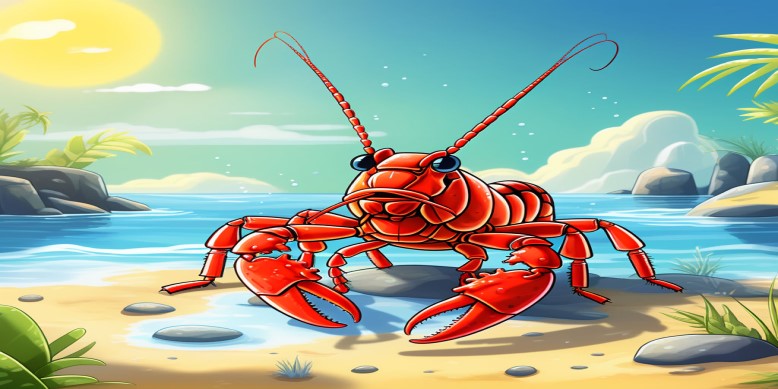
At Roatán Airport, the familiar scents of the Caribbean tropics tickled their nostrils and turned their heads.
“Where to, gringo?” the chocolate-colored taxi driver was smiling with all his white teeth.
“To the boat terminal to Helena island,” Jack preempted his friend and both laughed.
The boat was whisking them to the island. Local housewives were returning home with their shopping, their children crawling on the deck of the saloon, crabbing at strangers for coins. They came up on deck. The captain, a young chap, spoke good English and, taking the proffered can of beer, melted into gratitude:
“Tomorrow my uncle is going fishing on the reef. There are a lot of lobsters out there. If you want to spend the day for real, I’ll tell him and he’ll take you. Pay him a little, they charge tourists three times the price,” he winked at them and crunched the empty can.
By dawn, the fishing skiff ‘Black Pearl’ was already skimming the surface of the fog-shrouded sea. Uncle Guermo turned out to be very companionable, charged a reasonable price, and cheered up when the guests offered him a can of cold beer for breakfast. An hour later they were there.
“This is where our people fish and set lobster traps,” the fisherman finished his beer, “we don’t take tourists to this spot. The fish are not scared here, the ships avoid these places, and there are a lot of reefs. At high tide, you can’t see them, but at low tide, they show their teeth,” he pushed the anchor into the water and started to prepare fishing rods, throwing the bait around the boat.
Immediately the big fish appeared, and the water around the boat boomed. Within an hour the whole bottom of the boat was covered with tuna, mackerel, and barracuda. A cheerful fisherman was stowing the catch in a container with ice. And friends decided to try to catch some lobsters, the depth was less than 10 meters.
The lobster’s tendrils emerged from the coral niche, and Jack deftly hooked it. The lobster, struggling, dug a furrow in the sand with its tail and pulled out a coin.
“Where? ” John’s eyes widened.
“Underneath us!” Jack laughed.
They were diving, forgetting about the lobsters.
“Let’s get out of here, boys, it’s going to be fun soon,” the fisherman whistled to them, pointing to the sky. Indeed, a black cloud was swelling on the horizon.
“Not much for you guys,” uncle Guermo flicked his fingernail critically at a lone lobster. Well, you can try it again tomorrow, I’ll be back for the fish. It’s a full moon, we only get this kind of fishing once a month…”
“Yeah, only one lobster, but we had fun,” Jack smiled enigmatically, “mark this spot,” he whispered to John.
“Already did,” John was tucking his GPS into pocket.
When they tied the boat to the dock at dusk, rain was pouring from the sky. The fisherman was pleased: the guests had left him their catch.
“If you want, come to the pier at five in the morning,” he waved goodbye.
Back at the hotel, John brushed the golden coin off with toothpaste and rushed to the book, flipping through the pages frantically to find the right one.
“Jack, it’s a galleon, damn it! We found a doubloon from 1558!”
They dipped the doubloon into a glass of rum and drank it for two, celebrating the find.
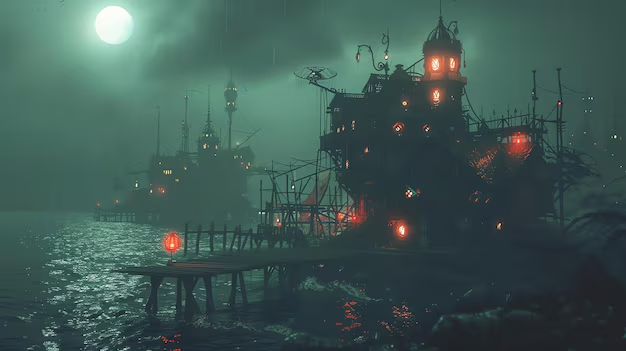
It was raining, they couldn’t sleep and a bottle of rum was just what they needed. And John’s thermos was full of his favorite strawberry ice cream. It rained all the next day. But the friends were not bored. They chartered a one-masted yawl, equipped with a dozen tanks of compressed air and a cove of rope. Hammers and pickaxes were borrowed from a local workshop.
They set sail early in the morning and soon anchored at the point. On their first dive, they pulled out a piece of coral, broke it open, and found a dozen silver coins in it. Their luck was better on the second attempt. A few golden coins and coral fragments also containing silver were the haul. The pile of finds was on deck, and they were busy with it for the rest of the day crushing the coral pieces with hammers. Nearby, a fishing boat was setting traps for lobsters. John looked through his binoculars and saw that the fishermen were watching them too. On the morning of the second day, the boat came closer:
“Hey, mates! This is our clearing, we’re fishing here,” they shouted, “go away, there is plenty of room for everyone in the sea!”
“OK, Captain, I’ve got it, we’ve got a leaking shaft bearing. We’re trying to fix it, probably take another day,” John lied.
The fisherman didn’t believe him:
“You have a sail, and tomorrow at dawn I want you out of here, go away,” he grinned unkindly shaking with rifle in his hand.
“We’ve found what we were looking for, Jack,” John patted his friend on the shoulder, “looks like this is where the galleon sunk, there’s tons of treasure down there. We’ll be back next year, in our boat..”
The next morning they tried to pull the anchor, but it wouldn’t budge. Jack put on his gear, jumped into the water, and walked along the anchor rope. The anchor was caught in a coral crevice with a growth sticking out that looked like the overgrown barrel of a ship’s gun. To get the anchor out they have to move the barrel or cut off a piece of the damned coral.
Jack tried to break the coral with a hammer, but the work was slow and there was a pile of heavy stones under the coral skin. From the crack, he pulled out a gold chain, about three feet long. The air in his tank ran out and he climbed up.
“John, this looks like ship’s ballast, all neatly shaped stones, obviously man-made, and there’s a cannon barrel sticking out. Look what I found,” Jack exhaled as he threw the trophy onto the deck. They laughed at their good fortune, but after a moment John became thoughtful. He nodded at a fishing boat and shook his head:
“They won’t get away from us. We’ve got to pull out a damn anchor or we’ll leave them a sign. Let’s try it together while there’s still time…”
The two of them went underwater. They worked with pickaxes and found more gold, but the anchor was firmly in place.
Jack pulled another stone away and a shiver ran down his spine. A yellow mask was staring back at him with huge, empty eyes. He backed away from the diabolical obsession and at that moment they heard the mosquito-like sound of an engine. The belly of the boat that had sucked itself onto their yacht was seen through the water.
When they surfaced, they saw that the fishermen were already on the yacht’s deck with the gold they had found in their hands. They had seen everything! What happened next was a matter of seconds. A shot rang out, followed by another. John collapsed, the bullet hitting him in the head. Jack, horrified, dived, dragging the lifeless John with him. Down below, he stripped off his dead friend’s gear, lowered the body into the alcove where he had seen the strange mask, and covered it with a rock.
Cutting the anchor rope with a knife, Jack swam underwater away from the cursed place as long as there was enough air in his tanks. When he surfaced it was raining and visibility was almost nil. Jack inflated both waistcoats with the remaining air and dumped the tanks. With his last strength, he swam towards the lighthouse and the waistcoats saved him. When he reached the island in the dead of night, he collapsed on the sand, panting from exhaustion and the nightmare of his experience then crawled into the thicket where his strength left him.
When Jack awoke, the tragedy of what had happened stood before his eyes. It was a miracle that he was alive, and he owed it to John, who had covered him with his body. He realized that the fishermen would burn the yacht and sink its wreckage to remove the evidence. A few days later, the owner of the missing yacht would report it to the police. Jack needed to get home as soon as possible and sort things out with the help of friends and lawyers.
In his dead friend’s waistcoat, he found a few more gold coins and a flat box covered with coral. After hiding everything with him, Jack walked along the shore to the harbor. There he was lucky: a boat of sea tramps was leaving the island. He had a little time to sneak back to the hotel where his driver’s license and the credit card he’d used to rent the yacht were still in his possession. The tramp boat took him to the mainland.
The box he found in John’s waistcoat contained large emerald pendants, the work of Spanish jewelers of centuries past. The black market dealers gave him two million dollars for that treasure. Sometime later, Jack saw those pendants in publications. They became a sensation and sold at auction for eight and a half million dollars. And the sixteenth-century gold doubloons he and John had found Jack fetched for a fantastic price later to the same dealers. He kept two left. Wealth came in exchange for the life of a friend.
$$$$$
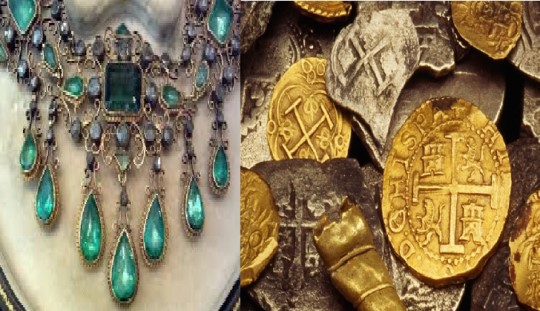
“What did your daddy call you, little princess?” Jack walks with the little girl as she circles him on her tricycle.
“Daddy called me Mat, he said I was too pale.” She stares at him inquisitively, her big green eyes sparkling with curiosity:
“Were you friends with my daddy?”
“Yes, we were called J.J. What do you like best?” Jack makes a funny face at her and she laughs.
“Uncle JJ, my favorite is strawberry ice cream,” she said, pedaling hard on her bike.
A lump forms in his throat and Jack rubs his eyes with his fingers.
“You’re just like your daddy,” he whispers, tying a simple cord around the girl’s neck. On the cord is a golden doubloon from the bottom of the sea.
“Take care of this talisman, it’s a gift from your daddy.”
Mat looks at him curiously:
“Did you get a grain of sand in your eye? It happens to me too, my mum says I have to wash it out with water…”
“Matilda, from now on you’re going to have a lot of ice cream, but eat a little at a time so you don’t get a cold throat. OK?” Jack hugs the girl goodbye. She waves to him.
In these moments, he vows to find the killers and take revenge. To bury the body of his dead friend and to recover the treasure.
He puts half the money in the bank, in the name of little Matilda.
© Copyright №215032400262
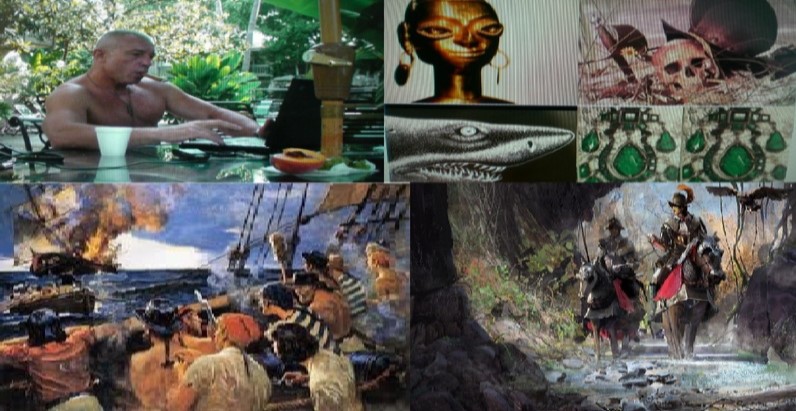
Безумно жаль Джона… Любовь и смерть невозможно запланировать, а значит не стоит и ожидать.
Жалко и Джека. Быть свидетелем смерти друга – тот ещё подарочек судьбы. И к черту все золото, лишь бы ещё разок увидеться, поболтать. Или помолчать глядя на вечереющее небо…
You ought to be a part of a contest for one of the best sites online. I am going to highly recommend this website!
What an information of clarity and preservation of precious knowledge on the subject of unpredictable feelings!